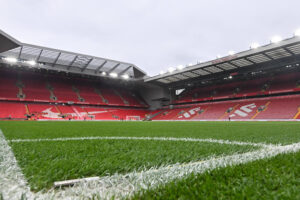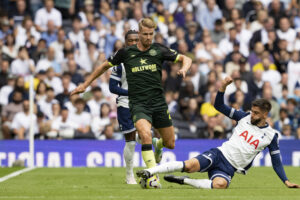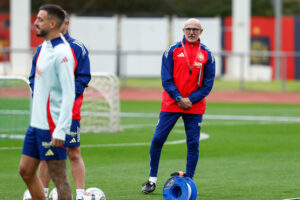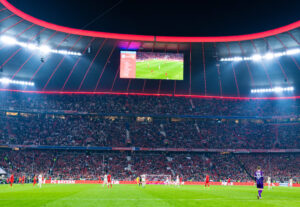For Manchester United, it always seems like the case is black or white much of the time, particularly under Ole Gunnar Solskjaer. A defeat means they’re not good enough, a win means they’re back on track, and will probably challenge for the title in a season or so. It’s probably symptomatic of the culture of this age of football, in which, in this 24-hour football culture, there always has to be a narrative, and that narrative almost always changes after each week.
It’s part of the issue with modern football, in which we almost fail to recognise that a game’s events can just be a game’s events, and it doesn’t have to be a prelude to something in the future. But word came in after United lost their first league game of the season against Crystal Palace on Saturday about how this means United are not good enough, although some did manage to leap into the defence of the side and Solskjaer.
But it’s not too brazen a question to ask that how much progress United have truly made under Solskjaer. It’s been almost two years since the Norwegian replaced Jose Mourinho and transformed the club. Well, transformed the club in terms of mood and attitude at the club, and not exactly tactically. And the fact that United haven’t exactly pulled down trees despite being a happier place perhaps speaks a bit to their manager.
Have Manchester United Progressed Under Solskjaer?
Impact of Bruno Fernandes
For much of last season, United looked listless, and Solskjaer’s security started to seem less and less…well, secure. The side direly lacked creativity, particularly with Paul Pogba away, and even when Pogba was on the pitch, a lack of innovation in the final third was an issue. But then Bruno Fernandes arrived in January and added some much-needed impetus to the side.
Fernandes’ impact isn’t just by the numbers. It’s not just the goals and assists the Portuguese midfielder has provided that’s been key. It’s the fact that Fernandes is a risky player, a dare-to-do playmaker whose energy has kicked United’s attack up a notch and made them a bit less one-dimensional.
Obvious Solskjaer Tactical Limitations Remain
But United’s obvious shortcomings are still quite the same. As shown in the defeat to Palace at Old Trafford, give United the ball and it’s harder for them to beat you. Once teams sit deep and stay compact, it still remains hard to break them down, despite the impact of Fernandes. This seems to stem from different reasons; the lack of wingers who take on defenders and/or stretch the play, and the full-backs hardly get forward to help in that regard, which explains interest in Alex Telles.
The fact that this remains rather obvious since Solskjaer took charge points out at limitations with the manager himself. There’s still endless debate as to whether or not Ole is the man for the job at Old Trafford, despite being at the job for over 20 months.
But, the truth is, while the former United forward might not be a hindrance at the club, he’s not necessarily a benefit. His style is one-dimensional, there’s hardly a Plan B, and Solskjaer has barely seemed capable of picking out specification opposition weakness and exploiting it. It’s not so much a case of Solskjaer being a bad manager, but rather that United can do a lot better.
What Does the Future Look Like for United?
United are still lacking personnel in key areas – not least a director of football. The addition of a more defensive midfielder might aid their attacking system – Scott McTominay is willing, but not a player of the highest calibre, Nemanja Matic is almost immobile, and Fred isn’t a defensive presence by any means. The signing of a defensive midfielder might not only give the full-backs more room to bomb forward, but also offer more solidity to a questionable centre-back pairing of Harry Maguire and Victor Lindelof.
But the biggest change needed is probably an obvious one. United will win games and go on runs under Solskjaer – Saturday’s defeat to Palace actually ended a 14-game unbeaten run in the league. But that will mostly be due to the fact that Solskjaer has a good relationship with the squad, a good run of fixtures, and the fact that this team is quite good, not really due to the manager’s acumen.
They say time will tell, but 21 months have told us little in terms of this manager. Solskjaer looked like a managerial halfway house for Manchester United when appointed, maybe his time should naturally see its end.
Main Photo
Embed from Getty Images






